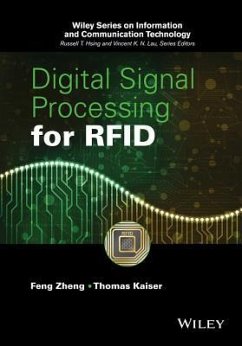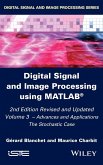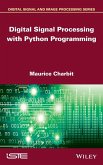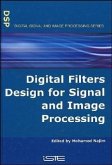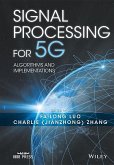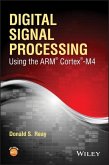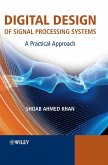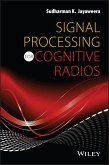- Gebundenes Buch
- Merkliste
- Auf die Merkliste
- Bewerten Bewerten
- Teilen
- Produkt teilen
- Produkterinnerung
- Produkterinnerung
This book discusses the fundamentals of RFID and the state-of-the-art research results in signal processing for RFID, including MIMO, blind source separation, anti-collision, localization, covert RFID and chipless RFID. Aimed at graduate students as well as academic and professional researchers/engineers in RFID technology, it enables readers to become conversant with the latest theory and applications of signal processing for RFID. Key Features: * Provides a systematic and comprehensive insight into the application of modern signal processing techniques for RFID systems * Discusses the…mehr
Andere Kunden interessierten sich auch für
![Digital Signal and Image Processing Using Matlab, Volume 3 Digital Signal and Image Processing Using Matlab, Volume 3]() Gérard BlanchetDigital Signal and Image Processing Using Matlab, Volume 3187,99 €
Gérard BlanchetDigital Signal and Image Processing Using Matlab, Volume 3187,99 €![Digital Signal Processing (Dsp) with Python Programming Digital Signal Processing (Dsp) with Python Programming]() Maurice CharbitDigital Signal Processing (Dsp) with Python Programming187,99 €
Maurice CharbitDigital Signal Processing (Dsp) with Python Programming187,99 €![Digital Filters Design for Signal and Image Processing Digital Filters Design for Signal and Image Processing]() Digital Filters Design for Signal and Image Processing333,99 €
Digital Filters Design for Signal and Image Processing333,99 €![Signal Processing for 5g Signal Processing for 5g]() Signal Processing for 5g159,99 €
Signal Processing for 5g159,99 €![Digital Signal Processing Using the Arm Cortex M4 Digital Signal Processing Using the Arm Cortex M4]() Donald S ReayDigital Signal Processing Using the Arm Cortex M4102,99 €
Donald S ReayDigital Signal Processing Using the Arm Cortex M4102,99 €![Digital Design of Signal Processing Systems Digital Design of Signal Processing Systems]() Shoab A. KhanDigital Design of Signal Processing Systems167,99 €
Shoab A. KhanDigital Design of Signal Processing Systems167,99 €![Signal Processing for Cognitive Radios Signal Processing for Cognitive Radios]() Sudharman K JayaweeraSignal Processing for Cognitive Radios160,99 €
Sudharman K JayaweeraSignal Processing for Cognitive Radios160,99 €-
-
-
This book discusses the fundamentals of RFID and the state-of-the-art research results in signal processing for RFID, including MIMO, blind source separation, anti-collision, localization, covert RFID and chipless RFID. Aimed at graduate students as well as academic and professional researchers/engineers in RFID technology, it enables readers to become conversant with the latest theory and applications of signal processing for RFID. Key Features: * Provides a systematic and comprehensive insight into the application of modern signal processing techniques for RFID systems * Discusses the operating principles, channel models of RFID, RFID protocols and analog/digital filter design for RFID * Explores RFID-oriented modulation schemes and their performance * Highlights research fields such as MIMO for RFID, blind signal processing for RFID, anti-collision of multiple RFID tags, localization with RFID, covert RFID and chipless RFID * Contains tables, illustrations and design examples
Hinweis: Dieser Artikel kann nur an eine deutsche Lieferadresse ausgeliefert werden.
Hinweis: Dieser Artikel kann nur an eine deutsche Lieferadresse ausgeliefert werden.
Produktdetails
- Produktdetails
- Verlag: Wiley
- Seitenzahl: 312
- Erscheinungstermin: 2. Mai 2016
- Englisch
- Abmessung: 244mm x 173mm x 18mm
- Gewicht: 590g
- ISBN-13: 9781118824313
- ISBN-10: 1118824318
- Artikelnr.: 42964386
- Herstellerkennzeichnung
- Libri GmbH
- Europaallee 1
- 36244 Bad Hersfeld
- gpsr@libri.de
- Verlag: Wiley
- Seitenzahl: 312
- Erscheinungstermin: 2. Mai 2016
- Englisch
- Abmessung: 244mm x 173mm x 18mm
- Gewicht: 590g
- ISBN-13: 9781118824313
- ISBN-10: 1118824318
- Artikelnr.: 42964386
- Herstellerkennzeichnung
- Libri GmbH
- Europaallee 1
- 36244 Bad Hersfeld
- gpsr@libri.de
Dr Feng Zheng, University of Duisburg-Essen, Germany Feng Zheng received his Ph.D. degree from Beijing University of Aeronautics and Astronautics in 1993. He held an Alexander-von-Humboldt Research Fellowship at University of Duisburg and was an Associate Professor in Chinese Academy of Sciences. Dr Thomas Kaiser, University of Duisburg-Essen, Germany Thomas Kaiser received the Ph.D. degree in 1995 with distinction and the German habilitation degree in 2000, both from Gerhard-Mercator-University, Duisburg, and in electrical engineering.
Preface xi
Acknowledgements xiii
Abbreviations xv
1 Introduction 1
1.1 What is RFID? 1
1.2 A Brief History of RFID 2
1.3 Motivation and Scope of this Book 2
1.4 Notations 5
References 5
2 Fundamentals of RFID Systems 6
2.1 Operating Principles 6
2.2 Passive, Semi-Passive/Semi-Active and Active RFID 8
2.3 Analogue Circuits for RFID 10
2.4 Circuit Analysis for Signal Transfer in RFID 11
2.4.1 Equivalent Circuit of Antennas in Generic Communication Links 12
2.4.2 Load Modulation 13
2.4.3 Backscattering Modulation 15
2.5 Signal Analysis of RFID Systems 17
2.5.1 Qualitative Analysis 17
2.5.2 Quantitative Analysis 19
2.6 Statistical Channel Models 21
2.6.1 Backgrounds of Rayleigh, Ricean and Nakagami Fading 21
2.6.2 Statistical Channel Models of RFID Systems 26
2.6.3 Large Scale Path Loss 27
2.7 A Review of RFID Protocol 28
2.7.1 Physical Layer 29
2.7.2 MAC Layer 32
2.8 Challenges in RFID 36
2.9 Summary 36
Appendix 2.A Modified Bessel Function of the First Kind 37
References 38
3 Basic Signal Processing for RFID 40
3.1 Bandpass Filters and their Applications to RFID 40
3.1.1 Lowpass Filter Performance Specification 40
3.1.2 Lowpass Filter Design 42
3.1.3 Bandpass Filter Design 47
3.1.4 Bandpass Filters for RFID Systems 49
3.2 Matching Filters and their Applications to RFID 54
3.3 A Review of Optimal Estimation 58
3.3.1 Linear Least Square Estimation 58
3.3.2 Linear Minimum Mean Square Error Estimation 59
3.3.3 Maximum Likelihood Estimation 61
3.3.4 Comparison of the Three Estimation Algorithms 62
3.4 Summary 64
Appendix 3.A Derivation of Poles of the Chebyshev Filter 67
References 68
4 RFID-Oriented Modulation Schemes 69
4.1 A Brief Review of Analogue Modulation 69
4.2 Amplitude- and Phase-Shift Keying and Performance Analysis 72
4.2.1 M-ary Quadrature Amplitude Modulation 72
4.2.2 Symbol Error Rate Analysis of M-QAM 74
4.2.3 Numerical Results for M-QAM 80
4.3 Phase-Shift Keying and Performance Analysis 81
4.4 Frequency-Shift Keying and Performance Analysis 85
4.5 Summary 90
Appendix 4.A Derivation of SER Formula (4.24) 91
Appendix 4.B Derivation of SER Formula (4.40) 93
References 94
5 MIMO for RFID 95
5.1 Introduction 95
5.2 MIMO Principle 97
5.3 Channel Modelling of RFID-MIMO Wireless Systems 100
5.4 Design of Reader Transmit Signals 102
5.4.1 Signal Design 102
5.4.2 Simulation Results 103
5.5 Space-Time Coding for RFID-MIMO Systems 105
5.5.1 A Review of Real Orthogonal Design 105
5.5.2 Space-Time Coding for RFID-MIMO Systems 110
5.5.3 Two Space-Time Decoding Approaches for RFID-MIMO Systems 111
5.5.4 Simulation Results 113
5.6 Differential Space-Time Coding for RFID-MIMO Systems 122
5.6.1 A Review of Unitary DSTC 122
5.6.2 Application of Unitary DTSC to RFID 125
5.6.3 Simulation Results 126
5.7 Summary 127
Appendix 5.A Alamouti Space-Time Coding for Narrowband Systems 129
Appendix 5.B Definition of Group 133
Appendix 5.C Complex Matrix/Vector Gaussian Distribution 133
Appendix 5.D Maximum Likelihood Receiver for Unitary STC 134
References 136
6 Blind Signal Processing for RFID 138
6.1 Introduction 138
6.2 Channel Model of Multiple-Tag RFID-MIMO Systems 141
6.2.1 Channel Model of Single-Tag RFID-MIMO Systems 141
6.2.2 Channel Model of Multiple-Tag RFID-MIMO Systems 141
6.3 An Analytical Constant Modulus Algorithm 143
6.4 Application of ACMA to Multiple-Tag RFID Systems 150
6.5 Summary 160
References 164
7 Anti-Collision of Multiple-Tag RFID Systems 166
7.1 Introduction 166
7.2 Tree-Splitting Algorithms 168
7.2.1 Mean Identification Delay 171
7.2.2 Collision Analysis and Transmission Efficiency: Approach I 173
7.2.3 Collision Analysis and Transmission Efficiency: Approach II 175
7.2.4 Numerical Results 185
7.2.5 Variants of TS Algorithms 194
7.3 Aloha-Based Algorithm 194
7.3.1 Mean Identification Delay 195
7.3.2 Collision Analysis and Transmission Efficiency 197
7.3.3 Numerical Results 198
7.3.4 Adaptive Frame Size Aloha Algorithms 200
7.4 Summary 212
Appendix 7.A Inclusion-Exclusion Principle 213
Appendix 7.B Probability of Successful Transmissions in Some Particular
Time Slots in Aloha 214
Appendix 7.C Probability of an Exact Number of Successful Transmissions in
Aloha 215
References 217
8 Localization with RFID 220
8.1 Introduction 220
8.2 RFID Localization 223
8.2.1 Geometric Class 224
8.2.2 Proximity Class 228
8.3 RFID Ranging - Frequency-Domain PDoA Approach 232
8.4 RFID AoA Finding - Spatial-Domain PDoA 235
8.5 NLoS Issue 241
8.6 Summary 244
References 245
9 Some Future Perspectives for RFID 249
Acknowledgements xiii
Abbreviations xv
1 Introduction 1
1.1 What is RFID? 1
1.2 A Brief History of RFID 2
1.3 Motivation and Scope of this Book 2
1.4 Notations 5
References 5
2 Fundamentals of RFID Systems 6
2.1 Operating Principles 6
2.2 Passive, Semi-Passive/Semi-Active and Active RFID 8
2.3 Analogue Circuits for RFID 10
2.4 Circuit Analysis for Signal Transfer in RFID 11
2.4.1 Equivalent Circuit of Antennas in Generic Communication Links 12
2.4.2 Load Modulation 13
2.4.3 Backscattering Modulation 15
2.5 Signal Analysis of RFID Systems 17
2.5.1 Qualitative Analysis 17
2.5.2 Quantitative Analysis 19
2.6 Statistical Channel Models 21
2.6.1 Backgrounds of Rayleigh, Ricean and Nakagami Fading 21
2.6.2 Statistical Channel Models of RFID Systems 26
2.6.3 Large Scale Path Loss 27
2.7 A Review of RFID Protocol 28
2.7.1 Physical Layer 29
2.7.2 MAC Layer 32
2.8 Challenges in RFID 36
2.9 Summary 36
Appendix 2.A Modified Bessel Function of the First Kind 37
References 38
3 Basic Signal Processing for RFID 40
3.1 Bandpass Filters and their Applications to RFID 40
3.1.1 Lowpass Filter Performance Specification 40
3.1.2 Lowpass Filter Design 42
3.1.3 Bandpass Filter Design 47
3.1.4 Bandpass Filters for RFID Systems 49
3.2 Matching Filters and their Applications to RFID 54
3.3 A Review of Optimal Estimation 58
3.3.1 Linear Least Square Estimation 58
3.3.2 Linear Minimum Mean Square Error Estimation 59
3.3.3 Maximum Likelihood Estimation 61
3.3.4 Comparison of the Three Estimation Algorithms 62
3.4 Summary 64
Appendix 3.A Derivation of Poles of the Chebyshev Filter 67
References 68
4 RFID-Oriented Modulation Schemes 69
4.1 A Brief Review of Analogue Modulation 69
4.2 Amplitude- and Phase-Shift Keying and Performance Analysis 72
4.2.1 M-ary Quadrature Amplitude Modulation 72
4.2.2 Symbol Error Rate Analysis of M-QAM 74
4.2.3 Numerical Results for M-QAM 80
4.3 Phase-Shift Keying and Performance Analysis 81
4.4 Frequency-Shift Keying and Performance Analysis 85
4.5 Summary 90
Appendix 4.A Derivation of SER Formula (4.24) 91
Appendix 4.B Derivation of SER Formula (4.40) 93
References 94
5 MIMO for RFID 95
5.1 Introduction 95
5.2 MIMO Principle 97
5.3 Channel Modelling of RFID-MIMO Wireless Systems 100
5.4 Design of Reader Transmit Signals 102
5.4.1 Signal Design 102
5.4.2 Simulation Results 103
5.5 Space-Time Coding for RFID-MIMO Systems 105
5.5.1 A Review of Real Orthogonal Design 105
5.5.2 Space-Time Coding for RFID-MIMO Systems 110
5.5.3 Two Space-Time Decoding Approaches for RFID-MIMO Systems 111
5.5.4 Simulation Results 113
5.6 Differential Space-Time Coding for RFID-MIMO Systems 122
5.6.1 A Review of Unitary DSTC 122
5.6.2 Application of Unitary DTSC to RFID 125
5.6.3 Simulation Results 126
5.7 Summary 127
Appendix 5.A Alamouti Space-Time Coding for Narrowband Systems 129
Appendix 5.B Definition of Group 133
Appendix 5.C Complex Matrix/Vector Gaussian Distribution 133
Appendix 5.D Maximum Likelihood Receiver for Unitary STC 134
References 136
6 Blind Signal Processing for RFID 138
6.1 Introduction 138
6.2 Channel Model of Multiple-Tag RFID-MIMO Systems 141
6.2.1 Channel Model of Single-Tag RFID-MIMO Systems 141
6.2.2 Channel Model of Multiple-Tag RFID-MIMO Systems 141
6.3 An Analytical Constant Modulus Algorithm 143
6.4 Application of ACMA to Multiple-Tag RFID Systems 150
6.5 Summary 160
References 164
7 Anti-Collision of Multiple-Tag RFID Systems 166
7.1 Introduction 166
7.2 Tree-Splitting Algorithms 168
7.2.1 Mean Identification Delay 171
7.2.2 Collision Analysis and Transmission Efficiency: Approach I 173
7.2.3 Collision Analysis and Transmission Efficiency: Approach II 175
7.2.4 Numerical Results 185
7.2.5 Variants of TS Algorithms 194
7.3 Aloha-Based Algorithm 194
7.3.1 Mean Identification Delay 195
7.3.2 Collision Analysis and Transmission Efficiency 197
7.3.3 Numerical Results 198
7.3.4 Adaptive Frame Size Aloha Algorithms 200
7.4 Summary 212
Appendix 7.A Inclusion-Exclusion Principle 213
Appendix 7.B Probability of Successful Transmissions in Some Particular
Time Slots in Aloha 214
Appendix 7.C Probability of an Exact Number of Successful Transmissions in
Aloha 215
References 217
8 Localization with RFID 220
8.1 Introduction 220
8.2 RFID Localization 223
8.2.1 Geometric Class 224
8.2.2 Proximity Class 228
8.3 RFID Ranging - Frequency-Domain PDoA Approach 232
8.4 RFID AoA Finding - Spatial-Domain PDoA 235
8.5 NLoS Issue 241
8.6 Summary 244
References 245
9 Some Future Perspectives for RFID 249
Preface xi
Acknowledgements xiii
Abbreviations xv
1 Introduction 1
1.1 What is RFID? 1
1.2 A Brief History of RFID 2
1.3 Motivation and Scope of this Book 2
1.4 Notations 5
References 5
2 Fundamentals of RFID Systems 6
2.1 Operating Principles 6
2.2 Passive, Semi-Passive/Semi-Active and Active RFID 8
2.3 Analogue Circuits for RFID 10
2.4 Circuit Analysis for Signal Transfer in RFID 11
2.4.1 Equivalent Circuit of Antennas in Generic Communication Links 12
2.4.2 Load Modulation 13
2.4.3 Backscattering Modulation 15
2.5 Signal Analysis of RFID Systems 17
2.5.1 Qualitative Analysis 17
2.5.2 Quantitative Analysis 19
2.6 Statistical Channel Models 21
2.6.1 Backgrounds of Rayleigh, Ricean and Nakagami Fading 21
2.6.2 Statistical Channel Models of RFID Systems 26
2.6.3 Large Scale Path Loss 27
2.7 A Review of RFID Protocol 28
2.7.1 Physical Layer 29
2.7.2 MAC Layer 32
2.8 Challenges in RFID 36
2.9 Summary 36
Appendix 2.A Modified Bessel Function of the First Kind 37
References 38
3 Basic Signal Processing for RFID 40
3.1 Bandpass Filters and their Applications to RFID 40
3.1.1 Lowpass Filter Performance Specification 40
3.1.2 Lowpass Filter Design 42
3.1.3 Bandpass Filter Design 47
3.1.4 Bandpass Filters for RFID Systems 49
3.2 Matching Filters and their Applications to RFID 54
3.3 A Review of Optimal Estimation 58
3.3.1 Linear Least Square Estimation 58
3.3.2 Linear Minimum Mean Square Error Estimation 59
3.3.3 Maximum Likelihood Estimation 61
3.3.4 Comparison of the Three Estimation Algorithms 62
3.4 Summary 64
Appendix 3.A Derivation of Poles of the Chebyshev Filter 67
References 68
4 RFID-Oriented Modulation Schemes 69
4.1 A Brief Review of Analogue Modulation 69
4.2 Amplitude- and Phase-Shift Keying and Performance Analysis 72
4.2.1 M-ary Quadrature Amplitude Modulation 72
4.2.2 Symbol Error Rate Analysis of M-QAM 74
4.2.3 Numerical Results for M-QAM 80
4.3 Phase-Shift Keying and Performance Analysis 81
4.4 Frequency-Shift Keying and Performance Analysis 85
4.5 Summary 90
Appendix 4.A Derivation of SER Formula (4.24) 91
Appendix 4.B Derivation of SER Formula (4.40) 93
References 94
5 MIMO for RFID 95
5.1 Introduction 95
5.2 MIMO Principle 97
5.3 Channel Modelling of RFID-MIMO Wireless Systems 100
5.4 Design of Reader Transmit Signals 102
5.4.1 Signal Design 102
5.4.2 Simulation Results 103
5.5 Space-Time Coding for RFID-MIMO Systems 105
5.5.1 A Review of Real Orthogonal Design 105
5.5.2 Space-Time Coding for RFID-MIMO Systems 110
5.5.3 Two Space-Time Decoding Approaches for RFID-MIMO Systems 111
5.5.4 Simulation Results 113
5.6 Differential Space-Time Coding for RFID-MIMO Systems 122
5.6.1 A Review of Unitary DSTC 122
5.6.2 Application of Unitary DTSC to RFID 125
5.6.3 Simulation Results 126
5.7 Summary 127
Appendix 5.A Alamouti Space-Time Coding for Narrowband Systems 129
Appendix 5.B Definition of Group 133
Appendix 5.C Complex Matrix/Vector Gaussian Distribution 133
Appendix 5.D Maximum Likelihood Receiver for Unitary STC 134
References 136
6 Blind Signal Processing for RFID 138
6.1 Introduction 138
6.2 Channel Model of Multiple-Tag RFID-MIMO Systems 141
6.2.1 Channel Model of Single-Tag RFID-MIMO Systems 141
6.2.2 Channel Model of Multiple-Tag RFID-MIMO Systems 141
6.3 An Analytical Constant Modulus Algorithm 143
6.4 Application of ACMA to Multiple-Tag RFID Systems 150
6.5 Summary 160
References 164
7 Anti-Collision of Multiple-Tag RFID Systems 166
7.1 Introduction 166
7.2 Tree-Splitting Algorithms 168
7.2.1 Mean Identification Delay 171
7.2.2 Collision Analysis and Transmission Efficiency: Approach I 173
7.2.3 Collision Analysis and Transmission Efficiency: Approach II 175
7.2.4 Numerical Results 185
7.2.5 Variants of TS Algorithms 194
7.3 Aloha-Based Algorithm 194
7.3.1 Mean Identification Delay 195
7.3.2 Collision Analysis and Transmission Efficiency 197
7.3.3 Numerical Results 198
7.3.4 Adaptive Frame Size Aloha Algorithms 200
7.4 Summary 212
Appendix 7.A Inclusion-Exclusion Principle 213
Appendix 7.B Probability of Successful Transmissions in Some Particular
Time Slots in Aloha 214
Appendix 7.C Probability of an Exact Number of Successful Transmissions in
Aloha 215
References 217
8 Localization with RFID 220
8.1 Introduction 220
8.2 RFID Localization 223
8.2.1 Geometric Class 224
8.2.2 Proximity Class 228
8.3 RFID Ranging - Frequency-Domain PDoA Approach 232
8.4 RFID AoA Finding - Spatial-Domain PDoA 235
8.5 NLoS Issue 241
8.6 Summary 244
References 245
9 Some Future Perspectives for RFID 249
Acknowledgements xiii
Abbreviations xv
1 Introduction 1
1.1 What is RFID? 1
1.2 A Brief History of RFID 2
1.3 Motivation and Scope of this Book 2
1.4 Notations 5
References 5
2 Fundamentals of RFID Systems 6
2.1 Operating Principles 6
2.2 Passive, Semi-Passive/Semi-Active and Active RFID 8
2.3 Analogue Circuits for RFID 10
2.4 Circuit Analysis for Signal Transfer in RFID 11
2.4.1 Equivalent Circuit of Antennas in Generic Communication Links 12
2.4.2 Load Modulation 13
2.4.3 Backscattering Modulation 15
2.5 Signal Analysis of RFID Systems 17
2.5.1 Qualitative Analysis 17
2.5.2 Quantitative Analysis 19
2.6 Statistical Channel Models 21
2.6.1 Backgrounds of Rayleigh, Ricean and Nakagami Fading 21
2.6.2 Statistical Channel Models of RFID Systems 26
2.6.3 Large Scale Path Loss 27
2.7 A Review of RFID Protocol 28
2.7.1 Physical Layer 29
2.7.2 MAC Layer 32
2.8 Challenges in RFID 36
2.9 Summary 36
Appendix 2.A Modified Bessel Function of the First Kind 37
References 38
3 Basic Signal Processing for RFID 40
3.1 Bandpass Filters and their Applications to RFID 40
3.1.1 Lowpass Filter Performance Specification 40
3.1.2 Lowpass Filter Design 42
3.1.3 Bandpass Filter Design 47
3.1.4 Bandpass Filters for RFID Systems 49
3.2 Matching Filters and their Applications to RFID 54
3.3 A Review of Optimal Estimation 58
3.3.1 Linear Least Square Estimation 58
3.3.2 Linear Minimum Mean Square Error Estimation 59
3.3.3 Maximum Likelihood Estimation 61
3.3.4 Comparison of the Three Estimation Algorithms 62
3.4 Summary 64
Appendix 3.A Derivation of Poles of the Chebyshev Filter 67
References 68
4 RFID-Oriented Modulation Schemes 69
4.1 A Brief Review of Analogue Modulation 69
4.2 Amplitude- and Phase-Shift Keying and Performance Analysis 72
4.2.1 M-ary Quadrature Amplitude Modulation 72
4.2.2 Symbol Error Rate Analysis of M-QAM 74
4.2.3 Numerical Results for M-QAM 80
4.3 Phase-Shift Keying and Performance Analysis 81
4.4 Frequency-Shift Keying and Performance Analysis 85
4.5 Summary 90
Appendix 4.A Derivation of SER Formula (4.24) 91
Appendix 4.B Derivation of SER Formula (4.40) 93
References 94
5 MIMO for RFID 95
5.1 Introduction 95
5.2 MIMO Principle 97
5.3 Channel Modelling of RFID-MIMO Wireless Systems 100
5.4 Design of Reader Transmit Signals 102
5.4.1 Signal Design 102
5.4.2 Simulation Results 103
5.5 Space-Time Coding for RFID-MIMO Systems 105
5.5.1 A Review of Real Orthogonal Design 105
5.5.2 Space-Time Coding for RFID-MIMO Systems 110
5.5.3 Two Space-Time Decoding Approaches for RFID-MIMO Systems 111
5.5.4 Simulation Results 113
5.6 Differential Space-Time Coding for RFID-MIMO Systems 122
5.6.1 A Review of Unitary DSTC 122
5.6.2 Application of Unitary DTSC to RFID 125
5.6.3 Simulation Results 126
5.7 Summary 127
Appendix 5.A Alamouti Space-Time Coding for Narrowband Systems 129
Appendix 5.B Definition of Group 133
Appendix 5.C Complex Matrix/Vector Gaussian Distribution 133
Appendix 5.D Maximum Likelihood Receiver for Unitary STC 134
References 136
6 Blind Signal Processing for RFID 138
6.1 Introduction 138
6.2 Channel Model of Multiple-Tag RFID-MIMO Systems 141
6.2.1 Channel Model of Single-Tag RFID-MIMO Systems 141
6.2.2 Channel Model of Multiple-Tag RFID-MIMO Systems 141
6.3 An Analytical Constant Modulus Algorithm 143
6.4 Application of ACMA to Multiple-Tag RFID Systems 150
6.5 Summary 160
References 164
7 Anti-Collision of Multiple-Tag RFID Systems 166
7.1 Introduction 166
7.2 Tree-Splitting Algorithms 168
7.2.1 Mean Identification Delay 171
7.2.2 Collision Analysis and Transmission Efficiency: Approach I 173
7.2.3 Collision Analysis and Transmission Efficiency: Approach II 175
7.2.4 Numerical Results 185
7.2.5 Variants of TS Algorithms 194
7.3 Aloha-Based Algorithm 194
7.3.1 Mean Identification Delay 195
7.3.2 Collision Analysis and Transmission Efficiency 197
7.3.3 Numerical Results 198
7.3.4 Adaptive Frame Size Aloha Algorithms 200
7.4 Summary 212
Appendix 7.A Inclusion-Exclusion Principle 213
Appendix 7.B Probability of Successful Transmissions in Some Particular
Time Slots in Aloha 214
Appendix 7.C Probability of an Exact Number of Successful Transmissions in
Aloha 215
References 217
8 Localization with RFID 220
8.1 Introduction 220
8.2 RFID Localization 223
8.2.1 Geometric Class 224
8.2.2 Proximity Class 228
8.3 RFID Ranging - Frequency-Domain PDoA Approach 232
8.4 RFID AoA Finding - Spatial-Domain PDoA 235
8.5 NLoS Issue 241
8.6 Summary 244
References 245
9 Some Future Perspectives for RFID 249

